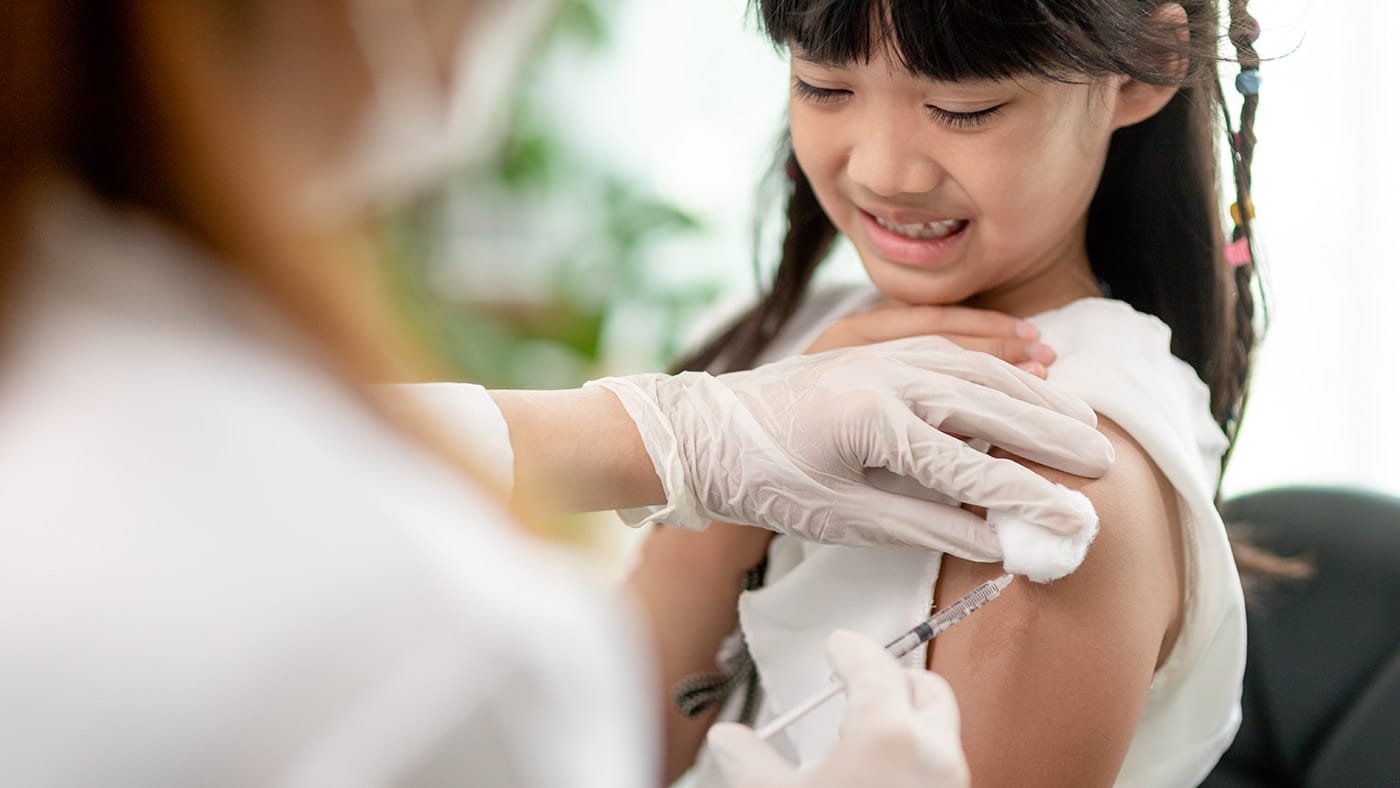Summer is in the air, and while children are focused on time off and warmer weather, not many parents are reveling in downtime. In addition to planning numerous summertime activities, you are probably stocking your cupboards with sunscreen and bug repellant to protect your child from painful sunburns and pesky bug bites. While these preventative measures are important, they are only a part of keeping your child healthy this summer.
When thinking about summer vacation, think about immunizations. Summer is the perfect time to make those annual doctor’s visits, and have immunizations updated. Some parents find it overwhelming to keep track of their child’s immunization status. Annual physicals provide an excellent opportunity to talk to your health care provider about your family’s vaccines. Parents of school-aged children are often surprised to find they are behind on their vaccinations. If your child is 7-11 years or older, chances are you need to get their immunizations updated.
The need for extra vigilance with your child’s immunizations has never been greater. Immunization-preventable diseases such as pertussis (whooping cough), meningococcal meningitis, and measles are rearing their ugly heads in the United States.
The rise in immunization-preventable diseases can be attributed to decreasing immunization rates. Even if your child was fully immunized at some point, it is important to ensure their protection with boosters at the appropriate time. A table showing which immunizations your adolescent may need can be found online at: CDC Recommended Child and Adolescent Immunization Schedule
Summer is an excellent time to ask your health care provider about these seven specific immunizations: Tdap, Hep B, Hep A, HPV, MMR, Varicella, and Menactra.
Listed below is a summary of some of the diseases that can be prevented with immunizations
Tdap, DTap, and Td
With so many “T’s” and “D’s” these acronyms can be confusing, as they seem so similar. All three immunizations include a “T” for tetanus and a “D” for diphtheria. The “P” in DTaP and Tdap stands for pertussis (whooping cough). The primary difference between DTaP and Tdap is age appropriateness. DTaP immunization is approved for children younger than 7 years old. Tdap, on the other hand, is approved for children older than 7 years old. Td is simply a booster given every 10 years and covers tetanus and diphtheria.
Pertussis causes violent, irrepressible coughing and makes it extreme difficulty to take a breath between coughing fits. This often leads to hospitalization and, in the worst cases, death. Unfortunately, infants are the most vulnerable to pertussis because their airways are so much smaller than older children, teens, and adults. Sadly, pertussis is commonly spread to infants from parents, grandparents, or older siblings who are not adequately immunized. Even children fully immunized before starting Kindergarten are at risk for contracting and spreading pertussis. Regardless of previous vaccinations, children should receive a Tdap booster at age 11 to protect themselves and the infants with whom they come in contact. You can’t be too careful in getting your Tdap booster. This immunization is so important it is given to teens during adolescent pregnancy, to ensure protection of the newborn infant.
Tetanus or “Lockjaw” is perhaps the most well-known of the three diseases, although it is relatively rare. The disease is caused by a bacteria found in soil, dust, and water and causes severe muscle spasms. In some cases, the muscle spasms are so severe they prevent the person from breathing, leading to respiratory arrest and death.
Diphtheria, like tetanus, is rare in most developed countries. Diphtheria begins with cold-like symptoms, a runny nose, and mild fever. The toxin released by diphtheria produces a thick lining that coats the back of the throat and nose eventually blocking the airway. Additionally, it can cause heart arrhythmias, damage to nerves, and organ failure. One in five children infected with diphtheria will not survive.
Hep A and Hep B
Hepatitis A is a virus that infects the liver and is spread through oral contact with infected feces. Because the virus is so contagious, even a microscopic amount of ingested Hepatitis A can infect the liver. Luckily, rates of Hepatitis A have dropped dramatically since the introduction of the immunization in 1995. Even if not required prior to school entry, your child should receive the Hepatitis A immunization if traveling anywhere outside the United States (with exception of Canada, Western Europe, Australia, New Zealand, and Japan.) It is also important to ensure protection against Hepatitis A if your child has contact with an adoptee from a country with a high incidence of Hepatitis A.
Hepatitis B also infects the liver, although it is spread through body fluids, blood, and open sores. The infection has the potential to cause chronic hepatitis which leads to costly and ongoing medical treatment. This can easily be avoided, however, by immunizing your child. If your child was given an immunization at birth, most likely it was Hepatitis B. To achieve adequate immunity, your child should have received two additional boosters. Check with your health care provider if you are unsure if your child is adequately immunized for Hepatitis B. The three-shot series can be given at any age and does not need to be restarted regardless of the length of time since the previous dose.
MMR and Varicella
The MMR vaccine immunizes against measles, mumps, and rubella. The varicella vaccine protects against chickenpox. All four of these diseases can lead to long-term disabilities and expensive treatments. Measles and chickenpox have potential to cause pneumonia, encephalitis, and brain damage. Mumps was the leading cause of meningitis and hearing loss before the MMR vaccine. Rubella contracted during pregnancy causes birth defects such as deafness, blindness, and heart defects.
All school-age children who receive one dose of MMR before Kindergarten need an additional booster by the time they are 11. School-age children that have not been vaccinated should receive two doses of MMR one month apart. There is a vaccine available that combines the MMR and varicella vaccine, referred to as the MMRV.
HPV
The HPV vaccine immunizes against the human papillomavirus, an infectious disease affecting the genitals, mouth, and throat. It is the most common sexually transmitted infection. The virus is responsible for cervical cancer. In 2010, nearly 12,000 women in the U.S. were diagnosed with cervical cancer and 4,000 of those women died from the disease. Unlike most cancer affecting women, HPV vaccination is a simple and effective way to prevent this type of cancer. The HPV vaccine is now recommended for boys and girls starting at age 11-12 years but can be administered at any age between 11 to 26 years.
Menactra
Meningococcal meningitis is a potentially fatal disease of the brain. Long-term effects of this disease include hearing loss and brain damage. The bacteria is spread through saliva and respiratory secretions. Places like college dormitories, with individuals living in close proximity to one another, have a higher incidence of Meningococcal outbreaks. Children 11-12 years old should receive Menactra, the meningococcal vaccine, and follow it with a booster when they are 16. College age children 19-21 years old should receive Menactra if they are unvaccinated or their first dose was given before age 16.
Get ahead of the game
Traveling Safely
Many countries are still affected by diseases that are uncommon in the United States. If you are planning a trip outside the U.S. this summer, see your health care provider to discuss immunization needs 4-6 weeks before your scheduled departure. The CDC has an interactive website for recommended vaccinations to receive before international travel. Simply enter your destination and other details, and the site will provide you with information on the necessary vaccines. It is critical to your family’s health and safety that you consider this before you leave the country. You can access this website at: CDC Travelers’ Health: Destinations
Summer Shots
Get a jump on your summer plans by scheduling your child’s appointment now. Back-to-school preparation is stressful enough, so kick off the summer by getting ahead of the game. It is beneficial to have a basic knowledge of what immunizations your child may need. Your health care provider can help you keep your child’s immunizations updated. Ensure your summer is both fun and safe by protecting your family’s health today.






